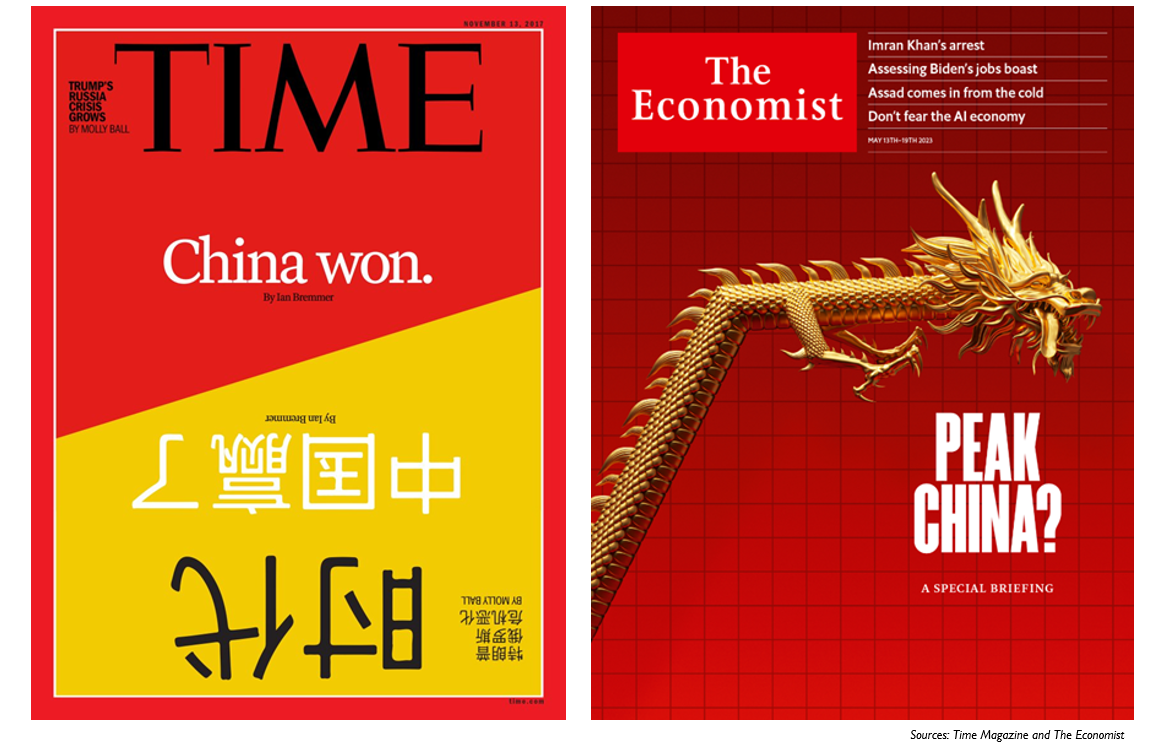by Joe Herrle, CFA
Vice President, Alternative Assets
Gracing the cover of Time Magazine in 2017, famed political author and Eurasia Group founder, Ian Bremmer claimed “China Won.” This statement was not necessarily controversial, as economists and political pundits all but guaranteed a new age of geopolitical and economic dominance led by the fast-growing nation. However, fast forward to today, and the headlines are quite different. Take, for instance, last week’s Bloomberg headline: “China Slowdown Means It May Never Overtake U.S. Economy, Forecast Shows.” Again, with China’s recent economic woes, such titles are commonplace today, and investor sentiment has turned dour. We frequently see analysts discuss whether China remains an investible market.
Sentimental Shift: from Economic Powerhouse to House of Cards
So, what caused the quick 180 turn in consensus opinion regarding China? And, is the nation indeed the inevitable new global superpower, or is this just a repeat of Japan in the ’80s? As usual, the truth is likely somewhere in between.
Many factors are causing pessimism toward China and its capital markets. Geopolitical tensions with the West, deglobalization, a quickly aging population, a potential conflict in Taiwan and corporate interference by the politburo have all dampened investor optimism. These issues have persisted for some time, but the immediate threat to China’s economy is an overleveraged real estate market, causing a credit crunch. Over the last decade, local Chinese governments and property developers have borrowed money to finance real estate and infrastructure projects that have not paid off. This resulted in potential defaults of Chinese real estate giants Evergrande and Country Garden. Since the real estate sector accounts for about 30% of China’s GDP, this dramatically affects the rest of the economy. The real estate downturn particularly impacts the Chinese consumer, who, on average, has 70% of their net worth in real estate (compared to 30% for Americans). So, when 70% of their net wealth takes a big hit, the propensity to go out and spend on goods and services declines quickly.
Making matters more complicated, fiscal and monetary policymakers in China refuse to come to the rescue with massive amounts of stimulus, as seen following other real estate-led downturns. While investors want to see this happen in the region, a measured approach might be better in the long run. First, the government would need to borrow more to support the real estate sector with stimulus, exacerbating the overleverage issue. Also, if Chinese policymakers were to provide direct stimulus checks to citizens, like the U.S. did during COVID, it would have a more muted impact there. The Chinese consumer only accounts for 38% of GDP, compared to 68% in the U.S., and they have a much higher predisposition to save than to spend as many do in the West.
So, stuck between a rock and a hard place, there is only one way out for China’s economy: to grow. After the most recent bout of draconian COVID lockdowns, the economy has sputtered and not rebounded as many would have expected. The economy that once grew at an annualized 9% pace for a decade is expected to grow half that amount this year. Foreign direct investment has reached a 15-year low, and youth unemployment is at record highs of over 21%. As bleak as all that is, it is essential to note that the economy is not crashing and may even be turning a corner. Just yesterday, surprising economic data showed that industrial output and consumption show signs of improvement. This data is far from definitive proof that the problems are over but it is a move in the right direction.
Other long-term concerns about the country are valid but should not drive investment decisions, such as the belief that President Xi Jinping is moving the country away from capitalism towards Maoism or a purer form of communism. The concern is likely overblown because stability in the country relies on an unwritten social contract between the people and the Chinese Communist Party. That is, society is generally willing to sacrifice liberties only as long as there is prosperity. Also, any incursion to take Taiwan would likely not result in a hot war. Lastly, sanctions, tariffs and restrictions between the U.S. and China will have a real impact, but an escalation into an all-out economic battle is highly unlikely. While each country will take its shots, China and the U.S. are inescapably intertwined economically and will likely find ways to coexist.
All of this is to say that while China may not be the inevitable superpower once believed, it is still an economic force that remains an investible market. China boasts the world’s second-largest population, a highly skilled labor force and an economy that should grow faster than any developed market. We may be nearing peak pessimism for their investment markets, which is why we remain neutral on the country within our portfolios.
Takeaways for the Week
Inflation data released on Wednesday showed the Consumer Price Index rose 3.7% over a year, led higher by energy prices. While the reading was hotter than forecast, the expectation remains that the Federal Reserve will keep rates unchanged at the September meeting
The market for IPOs, mostly dormant since 2021, is showing signs of life. Chipmaker Arm went public this week, with shares surging 25% on the first day of trading
United Auto Workers Union went on strike effective midnight yesterday. It is the first time the union has simultaneously walked out on all three major automakers in Detroit (Ford, GM, and Stellantis)


